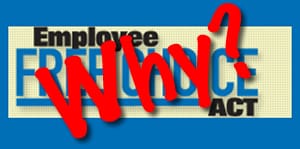Why Do We Need the "Employee Free Choice Act"?
Now that I'm back to labor blogging, some of you may be wondering why I care so much of late about the Employee Free Choice Act. It's not that I march in lockstep with my fellow Progressives across the country. But I've seen many friends and colleagues get treated unfairly when it comes to labor-man

Update, May 29, 2007:
A big shout out to our friends over at the so-called "Center for Union Facts" for being irked enough about my calling them out on the falsehoods about the Employee Free Choice Act that they choose to disseminate--they're a right-wing front group masquerading as a workers' rights organization, you know that, right?--that they linked to this post on Chicago Carless. I say. You can't pay for coverage like that! Thanks, guys!
#
(May 28, 2007) Now that I'm back to labor blogging, some of you may be wondering why I care so much of late about the Employee Free Choice Act. It's not that I march in lockstep with my fellow Progressives across the country. I've seen many friends and colleagues get treated unfairly when it comes to labor-management issues and in the line of work I'm in, I've heard far too many horror stories. I happen to think it's a damned good piece of legislation and the country's best hope of saving our dying middle class. Here's why...
In a Nutshell
The Employee Free Choice Act is widely considered to be the most important piece of labor legislation in America since the National Labor Relations (Wagner) Act of 1935 and enjoys strong bipartisan support. However, opponents of the Act are out there disseminating misinformation about its elements in order to kill it and keep America's workers from exercising what is supposed to be their legal right to come together to form unions and bargain for better wages, benefits, and working conditions.
Why the Employee Free Choice Act is Needed
The American middle class is quickly disappearing. Millions of workers increasingly struggle through long days for low wages and meager benefits. More than half of U.S. workers--60 million of them--say they would join a union right now if they could. That's because a union card is one of the best anti-poverty instruments in America: on average, union workers earn 30% more than their non-unionized counterparts, are 62% more likely to have employer-provided health coverage, and are an astounding 400% more likely to have pensions.
But it's more and more difficult for American workers to form unions to bargain for a better livelihood. On paper, the Wagner Act gives workers the right to form unions and collectively bargain. In practice, however, myriad loopholes and laughable penalties make it easy for companies to actively--and illegally--discriminate against workers seeking to exercise their federal labor rights.
According to national labor data, workers are illegally fired in one-quarter of all union organizing campaigns, including 1 in 5 active union supporters. More than 75% of companies force workers to attend one-on-one anti-union interviews with their supervisors. Half of all companies threaten to close the plant if a union is authorized. And one-third of companies take advantage of procedural loopholes--in many cases for years--in order to delay ever reaching a first contract.
Penalties for illegal firings and intimidation are ineffective and out of date. Financial penalties are so low, most companies simply pay them as a regular cost of doing business. And even for illegal firings, judicial remedies can be as hollow as simply requiring an employer to post a notice on a bulletin board.
When faced with threats like these, under the current system no American worker has a protected way to make a free, unfettered choice when it comes to forming a union.
What the Employee Free Choice Act Does
The Employee Free Choice Act will help bolster the middle class in America by by making it easier for working people to form unions and bargain for better wages, benefits, and working conditions. It does three things to level the playing field between employees and employers:
1. It strengthens financial penalties for companies that illegally coerce or intimidate employees in an effort to prevent them from forming a union;
2. It brings in a neutral third party to settle a contract when a company and a newly certified union cannot agree on a contract after 90 days;
3. It establishes majority sign-up, meaning that if a majority of employees sign union authorization cards validated by the National Labor Relations Board, the company must recognize the union.
With these three provisions in place, workers wishing to form unions and bargain for a better livelihood will be effectively shielded from much of the coercion, intimidation, and foot-dragging that thousands of companies engage in each year in an effort to unfairly deprive their employees of their freedom to form unions.
Falsehoods and the Truth About the Employee Free Choice Act
Some opponents of the Employee Free Choice Act--including several front organizations for business interests masquerading as workers' rights groups such as the so-called "Center for Union Facts" and the "National Right to Work Committee"--claim the Act would eliminate the existing secret-ballot system for certifying a new union--an alleged slap in the face to democracy--and open employees up to potential intimidation by union organizers to sign authorization cards. That's just not true.
Under the Employee Free Choice Act, workers are free to choose either majority sign-up or the existing secret-ballot system to authorize a new union. In fact, the same choice exists today, except right now it's management who gets to decide--and it's management who's in charge of the voting process. When the very people who may have threatened to fire you or close your place of business for organizing a union are the same ones in control of the authorization vote, that ceases to be a fair, uncoerced vote.
Moreover, new unions depend on the freely given support of workers in order to become authorized. Organizers engaging in intimidation would be detrimental to gaining that support. The record shows such union coercion rarely happens. Since the Wagner Act's inception, there have been only 42 verified cases of union coercion in the signing of authorization forms. Yet in 2005 alone, there were more than 31,000 verified cases of illegal firings and other forms of illegal discrimination perpetrated by companies against workers seeking to exercise their federal right to organize to seek a better life. That's a ratio of more than 30,000 to 1.
In reality, the Employee Free Choice Act puts the choice about how to authorize a union squarely in the hands of workers, where it belongs, and protects workers from the current, nonstop onslaught of illegal intimidation by anti-union companies.
What to Do
I and many other blogger around the country are concerned about the falsehoods being disseminated about the Employee Free Choice Act. A good way to fight back is to contact your local senators and tell them to support the Act's passage. You can use this on-line petition created by the AFL-CIO to be sent directly to your senators (based on the address you enter). You can also call you local senators in Washington and tell them to support the Act. You can find your senators' office phone numbers on the U.S. Senate contact page.
Finally, for a very thorough look into the Employee Free Choice Act, an enormous amount of information--including daily news updates regarding Senatorial support--can be found on the AFL-CIO's comprehensive Employee Free Choice Act page.
As I scribed earlier, I would watch for workers rights to be major issues in Election 2008. The next presidential election is gearing up to be won--or lost--on issues other than terrorism: issues such as the ability for working Americans to live a good life, be well-paid for their work, and retire with honor.
And that will make a hell of a change from 2004.




